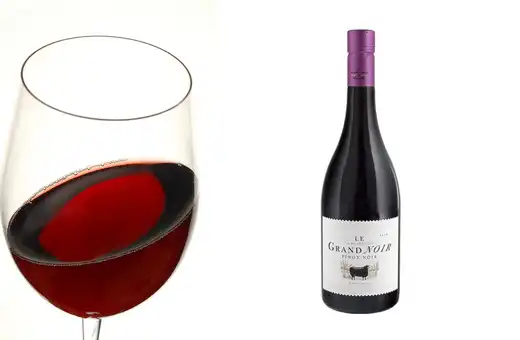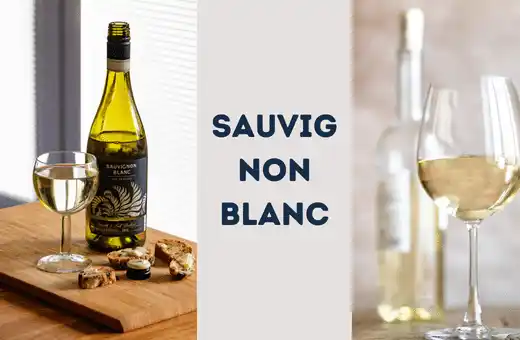Looking for a delicious meal to impress your dinner guests? Look no further than chicken marsala. This classic Italian dish is famous for its savory sauce, perfectly cooked chicken, and hearty mushrooms.
Whenever you cook a sumptuous meal, it’s always great to pair it with the perfect wine. And when it comes to pairing wine with chicken marsala or chicken piccata wine paring, choosing the right one can be quite challenging.
So, what is the best wine for chicken marsala? With so many wine varieties out there, you may end up feeling overwhelmed and confused about what to select.
But don’t worry; we have got you covered. In this blog post, we’re going to explore the best wines to pair with chicken marsala & chicken piccata so you can take your home cooking game to the next level.
Wine Pairing with Chicken Marsala Guide

Choosing the perfect wine for your Chicken Marsala can be a tricky task. However, it doesn’t have to be! Here are some tips and tricks on how to choose the best wine for your Chicken Marsala:
1. Consider Your Menu
The type of menu you’re serving will influence what kind of wine you should pair with your Chicken Marsala.
For example, if you are serving an Italian-inspired meal, look for a full-bodied Italian red such as Chianti or Barolo.
If you’re going for something more traditional and lighter, try a white Burgundy or Pinot Grigio instead.
2. Balance Acidity Levels
Another key factor to consider is the acidity level of your chosen wine. Chicken Marsala is a dish that has higher levels of acidity due to its ingredients (mushrooms, red wine and garlic).
Therefore, look for a wine with a good acidity balance to complement the acidity in the dish. A Sauvignon Blanc or Chardonnay would work well here.
3. Consider Sweetness Levels
Additionally, you will want to consider how sweet your wine is when pairing it with Chicken Marsala.
If you are using a sweeter variety, such as Marsala Superior, opt for something slightly more acidic such as a Pinot Noir or Chianti Classico Riserva.
On the other hand, if you are using a dry Marsala, try a sweeter wine such as a Moscato or Gewürztraminer.
4. Experiment
Don’t be afraid to experiment with different wines and find what works best for you.
Some people prefer red wines, while others may opt for whites, so make sure to try out a few various options before settling on one.
You may even find that you like the combination of two different wines better than just one!
Ultimately, choosing the right wine for your Chicken Marsala pairing is all about experimentation and finding what tastes best for you.
With these tips in mind, you can easily find the perfect wine to pair with your dish.
Discover More: Best Wine for Beef Bourguignon
Red wine paired with chicken marsala
1. Chianti Classico
If you’re looking for a classic pairing that never goes out of style, look no further than Chianti Classico.
This Italian red wine is made from Sangiovese grapes grown in the Chianti region of Tuscany.
Its acidity and tannins are a perfect match for the rich sauce in chicken marsala. At the same time, its fruity notes complement the dish’s earthy mushrooms.
2. Pinot Noir
For a slightly lighter, more delicate pairing, try Pinot Noir. This red wine is known for its fruity notes of cherry, strawberry, and raspberry, which pair perfectly with the sweetness of the marsala wine in the sauce.

The wine’s acidity also helps to cut through the richness of the dish, making it feel lighter on the palate.
If you prefer red wine, Pinot Noir would be the ideal choice to pair with chicken marsala.
This wine has a light and fruity taste that brings out a sweet flavor in the dish. It has a smooth texture that complements the tanginess of the sauce.
3. Barbera
If you’re looking for a type of wine with a little more punch, try a Barbera. This red wine from the Piedmont region of Italy has bold flavors of black cherry, plum, and blackberry that stand up to the rich sauce in chicken marsala.
Its high acidity also helps to cut through the fatty flavors in the dish, leaving a clean, crisp finish.
4. Merlot

Merlot is another great option, which is a versatile wine that goes well with many dishes. Its moderate tannin content makes it ideal for pairing with chicken marsala, and its velvety texture blends well with the sauce.
Explore More: Discover the Best Wine for Pot Roast
White wine paired with chicken marsala
1. Sauvignon Blanc
One of the best white wines to pair with chicken marsala is Sauvignon Blanc. This white wine has a crisp acidity that complements the richness of the sauce perfectly.

It’s light, refreshing, and has a citrusy flavor that enhances the taste of the chicken.
2. Chardonnay
Another great option is Chardonnay, which has a buttery richness that balances the saltiness of the dish. This wine is perfect for foodies who prefer a creamy and full-bodied flavor.
3. Verdicchio
For a white wine option, try a Verdicchio. This Italian white wine is known for its fresh, citrusy flavor, which pairs perfectly with the tanginess of the lemon juice often used in chicken marsala.
It also has enough body to stand up to the bold flavors in the dish, while its acidity helps to balance out the sweetness in the sauce.
Others drink to go with Chicken Marsala.
1. Rosé Wine
Rosé wine is another excellent choice for pairing with chicken marsala. It’s slightly sweet and highly refreshing, which balances the dish’s flavors.

Rosé wine has a fruity aroma that brings out the sweetness of the chicken marinade. It’s an excellent pairing for people who love the delicate taste of wine and food.
2. Sparkling Wine
If you’re looking for something special, sparkling wine is the perfect choice for chicken marsala.
It’s light and bubbly, and the subtle sweetness of the wine complements the tanginess of the sauce.
It’s perfect for celebratory dinners or gatherings, and its fizzy texture adds fun to the dining experience.
3. Prosecco
If you prefer a bubbly option, try a Prosecco. This Italian sparkling wine has a crisp, refreshing flavor that’s a perfect counterpoint to the rich, savory flavors of chicken marsala.

Its bubbles also help to cleanse the palate between bites, making each bite taste as good as the first.
4. Non-Alcoholic
If you prefer non-alcoholic beverages, you can still pair your chicken marsala with a tasty drink.
Ginger ale or soda is a great option because it has a mild sweetness that complements the dish without being overpowering.
For something more exotic, you can try Thai iced tea (Recipe) or lemon-lime sparkling water.
Which Wine To Avoid for Chicken Marsala?
When it comes to Chicken Marsala, a variety of wines can be used, but not all are appropriate.
Generally, it is best to avoid oaky and tannic red wines like Cabernet Sauvignon and Syrah, as they will overwhelm the delicate flavor of the dish.
Instead, lighter-bodied white wines such as Pinot Grigio or Sauvignon Blanc are preferable because they won’t overpower the flavors in the Marsala sauce.
If you love red wine with your meal, opt for one with lower tannins, such as Grenache or Barbera.
These medium-bodied options pair well with many chicken dishes and have just enough flavor to stand up against the boldness of Marsala sauce.
Wrap Up on Best Wine for Chicken Marsala.
Pairing wine with chicken marsala is simple and enjoyable. The right wine should enhance the flavors of the dish and complement the sauce’s richness.
While the options are plenty, choosing the perfect one shouldn’t be daunting. Whether it’s white, red, rosé, or sparkling, there’s a wine for everyone.
So, the next time you prepare a chicken marsala, choose the perfect wine to accompany it and enjoy a delightful dining experience.
FAQs
What kind of wine is used in Chicken Marsala?
Chicken Marsala is traditionally made with dry white wine, such as Pinot Grigio or Sauvignon Blanc.
However, it can also be prepared with a dry red wine like a Cabernet Sauvignon or even a sweet dessert wine like Marsala.
The most important thing to keep in mind when selecting a wine for Chicken Marsala is that the flavor of the dish should not overwhelm the subtlety of the wine.
A good rule of thumb is to choose a light-bodied and low-tannin variety so as to not overpower the delicate flavors of the dish.
When using sweet wines, make sure they are balanced out by adding some acidity or sweetness with stock or other ingredients.
Can you use any wine for Chicken Marsala?
Yes, you can use any wine for Chicken Marsala.
Generally, dry white wines like Sauvignon Blanc or Pinot Grigio are recommended for this dish. But if you prefer a red, Merlot and Cabernet Sauvignon are good choices as well.
The most important thing is to choose a wine that you enjoy drinking so that the flavor of the dish will be enhanced.
It’s also crucial to remember not to use too much wine — a few tablespoons should be enough!
Once your chicken has been cooked in the Marsala sauce and all other ingredients have been added, it’s ready to serve! Enjoy!
Do you have to use Marsala wine for chicken Marsala?
Not necessarily! The most important part of making chicken Marsala is the sauce — a combination of mushrooms, butter, garlic, and shallots sautéed in a reduced Marsala wine.
You can use other wines or fortified wines like Madeira instead for this dish if desired, as long as it has similar levels of sweetness.
With that said, using an authentic dry Marsala wine will give you the classic flavor that people expect from a good chicken Marsala.
If you don’t want to use alcohol at all, you can substitute it with broth or non-alcoholic cooking wine.
What’s the difference between dry and sweet Marsala wine?
The sweetness level of a particular wine can be identified by its color–dry Marsala wines typically range from pale gold to golden brown in hue, while sweet Marsala wines are usually darker in color, ranging from amber to deep ruby.
Sweet Marsala wines tend to be sweeter and have a syrupy texture, while dry Marsala has a crisper taste with nutty or smokey notes.
In terms of use, dry Marsala is often used for cooking savory dishes such as chicken Marsala, while sweet Marsala is more commonly used for desserts. Both types of wines can be enjoyed as an aperitif or dessert wine.
Marsala is a fortified wine made in the city of Marsala in Sicily, Italy. It has been produced since the 18th century and is often compared to port or sherry due to its sweetness levels and similarities in the production process.
However, it has distinctive features that make it unique such as its amber color and a bouquet of dried fruit and nuts. Whether dry or sweet, Marsala makes an excellent accompaniment to many dishes and desserts alike!
*Note: This content was written by an independent writer with no affiliation with any particular brand or organization. This content is for informational purposes only and should not be used as a substitute for professional advice.
What’s the difference between dry and sweet Marsala wine?
The primary difference between dry and sweet Marsala wines is the amount of residual sugar present.
Dry Marsala wines contain less than 8 grams of residual sugar per liter, while sweet Marsala wines have more than 140 grams of residual sugar per liter.
What is a substitute for Marsala wine in Chicken Marsala?
If you don’t have Marsala wine for your Chicken Marsala dish, you can use dry sherry or sweet vermouth as a substitute. Both of these substitutes have similar flavor notes to Marsala and will work well in the recipe.
If you are looking for an alcohol-free replacement, try using vegetable broth or chicken broth combined with a tablespoon of brown sugar.
This will give the recipe some sweetness that is reminiscent of the Marsala flavor without the alcohol content.
However, keep in mind that substituting for the Marsala may result in a slightly different taste than what is traditionally associated with Chicken Marsala.
Experiment and adjust to create a version that suits your tastes best! Enjoy!